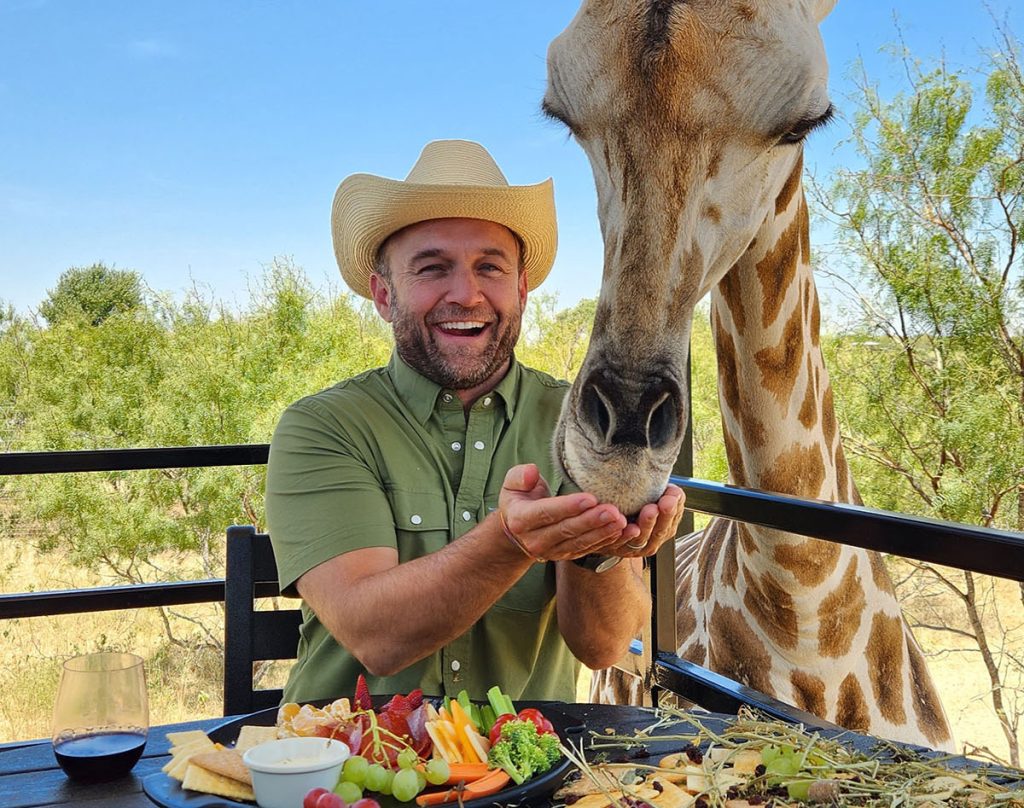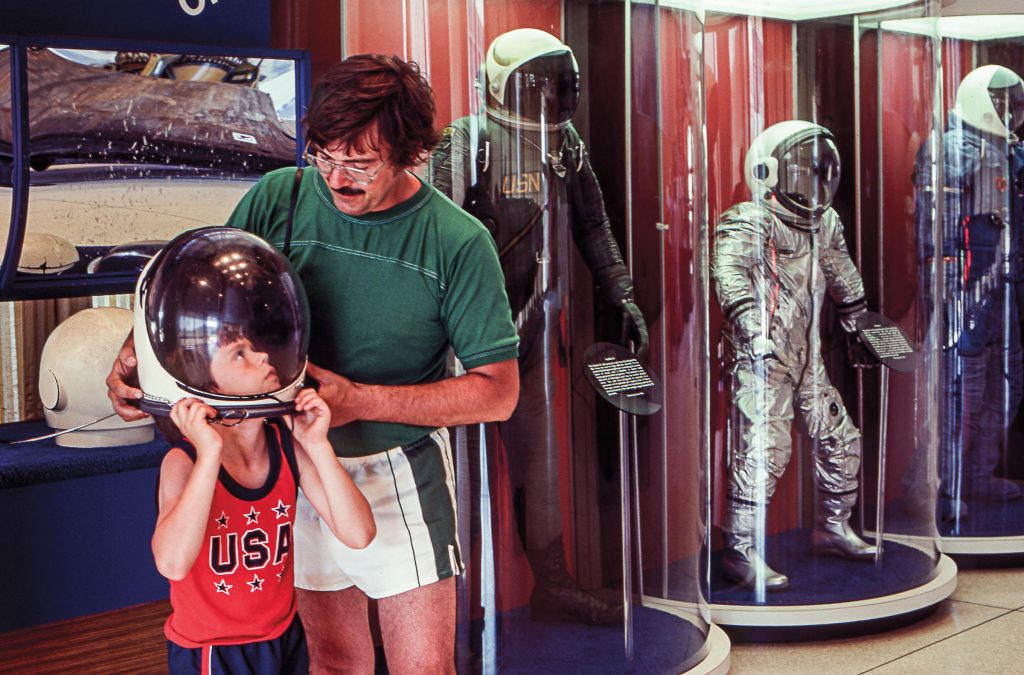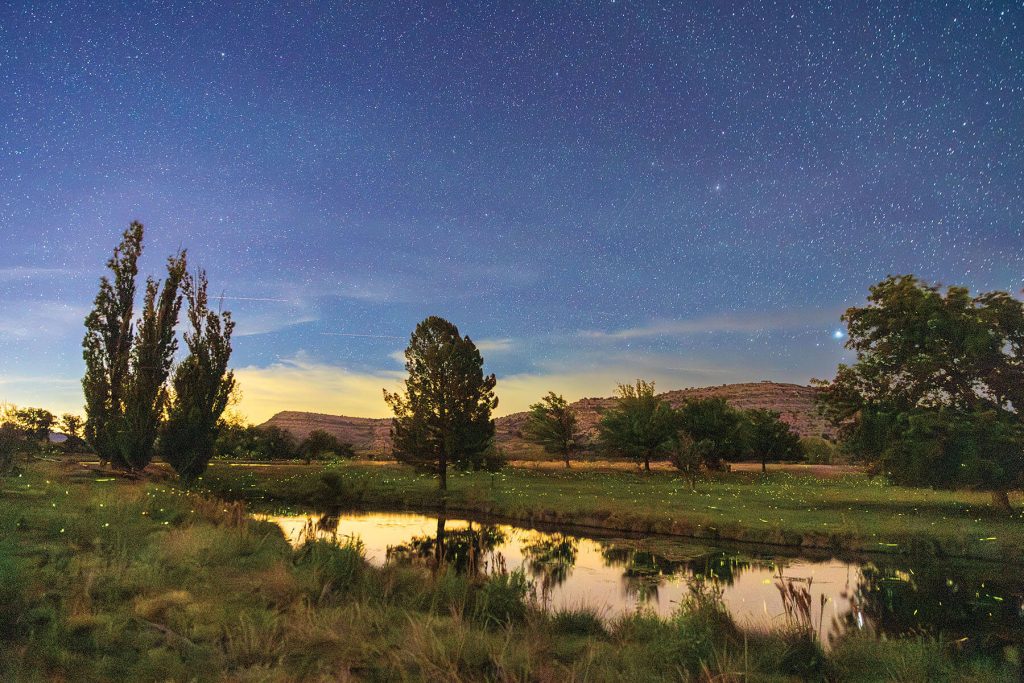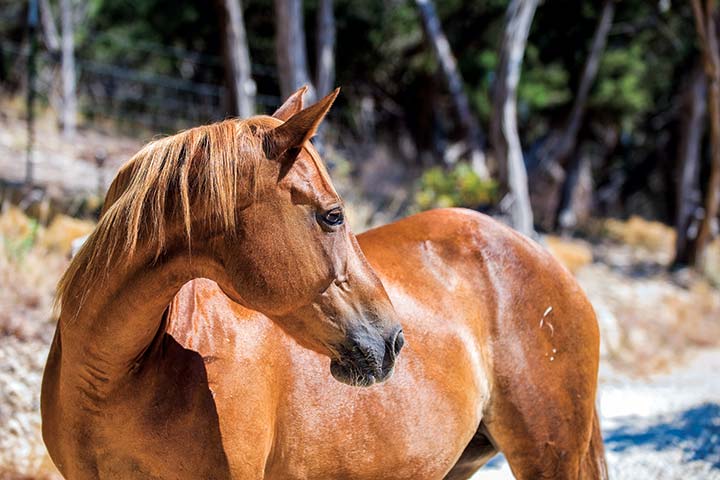
My horse Annie, a 16-year-old chestnut mare with soulful eyes and long lashes, relaxes her ears and ambles calmly toward me in the round pen, then breaks out in a yawn so wide I think she might be laughing at me. But things aren’t always as they seem. Wrangler Jodie James tips back his hat and looks upon us with a glimmer of pride. “That’s just about the biggest compliment a horse can pay a person,” he tells me in a calm drawl. Say what?
Follow us for a behind-the-scenes look at Travaasa’s farm.
Travaasa Experiential Resort Austin is at 13500 FM 2769 in Austin, about a half-hour’s drive from downtown. Rates range from $275 per night (including activities but not meals) to $500 including activities, 3 meals, and a $125 credit toward spa services or private classes). Call 512/258-7243.
Of course, Annie didn’t say a word, and that’s the point. I’m here at Travaasa, a resort and spa on the outskirts of Austin, hoping to learn more about non-verbal communication via the resort’s popular Equine Encounter program, one of many activities included in a stay. Surrounded by the cedar brakes, shin oaks, and rugged canyons of the Balcones Canyonlands Preserve, Travaasa offers more than a typical spa’s roster of indulgences and fine meals. Yes, a massage here may lull you into a dream state, and Chef Ben Baker’s attention to wholesome yet delicious cuisine may make you wish for a personal chef. But this place is about experiences. In fact, your room rate includes unlimited access to dozens of activities, including a ropes challenge course with a climbing wall and zipline, archery sessions, yoga and Pilates, swimming in a saline pool, two-step lessons, chicken-keeping, wine-tasting, making herbal tinctures, geocaching, hiking, riding a mechanical bull, and, in the stables near the resort’s 3-acre farm, a tranquil exercise in self-awareness and sensitivity called the Equine Encounter.
But before the five of us enter the round pen with our horse, we’ll need to learn a few things about trusting our leadership skills and projecting our confidence and energy. In the distance, the sounds of chortling chickens and the staccato songs of cicadas meld with the breathy whuffs and musical whinnies of a dozen horses as they spy us approaching the paddock area. Jodie releases them into the dusty arena, and they gallop and buck, then suddenly drop to the ground, one by one, rolling in the dirt like gleeful puppies. Equine and Agriculture Manager Keith Moon, who’ll guide us through today’s exercises, smiles. “Part of that is stretching,” he tells us. “It helps to realign their spines. But it also gets the bugs off.”
“Our program is about giving the horses a stress-free environment, keeping them in a relaxed state of mind,” he says. “Horses are very aware. They know everything that’s going on around them, and their self-preservation is geared toward good leadership. Within the herd, they’re looking for a strong animal to keep them safe, so if we take that role, it comes down to how precise and consistent we can be with our energy and our cues to them so we create an environment where they feel comfortable, where they trust us.”
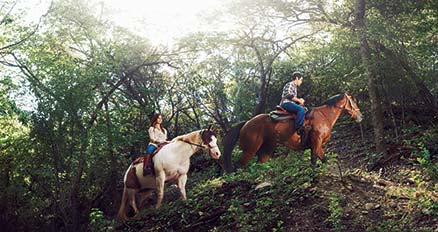 Our exercise will be simple: Without saying a word or touching them, we’ll direct their movements, ask them to change directions, then ask them to come to us. Our body language will do the communicating for us.
Our exercise will be simple: Without saying a word or touching them, we’ll direct their movements, ask them to change directions, then ask them to come to us. Our body language will do the communicating for us.
Then Keith delves into a topic I find surprising for a gravelly-voiced cowboy who has wrangled horses his whole life on ranches from Wyoming to Texas: the power of vulnerability.
“Thanks to a guest, I discovered Brené Brown and her TED talks,” he says, “and I was struck with how much what she said applies to our relationship with horses.” Brown, a research professor at the University of Houston, maintains that in human relationships, we cherish vulnerability in others but are often afraid to show it ourselves. “Horses,” says Keith, “are absolutely vulnerable, and they are not afraid to show it. They are able to read us the minute we walk into their presence; they can judge a situation intuitively and know if they should flee or if they can stay and check things out. If our energy is good, then they are good.”
I get the sense that Jodie and Keith are sizing us up as they choose a horse whose personality might complement our own. “That’s Abby,” says Keith, “a spirited little cutting horse we got down in Goliad. That paint horse is Pepper; she came here from East Texas. And this is Annie. She’s an old campaigner. We can put her with just about anyone.”
And so Annie goes with me. We groom our horses first, smoothing their lustrous coats with paddle brushes, making broad circles on their flanks, shoulders, and muscular necks. Annie seems to like it and whuffs her approval. We watch Jodie take his horse into the round pen and direct her around the space in a fluid movement that resembles a dance. When he holds his whip high to signal a higher energy, she moves faster; when he trails it on the ground, she slows down. He makes subtle shifts in positioning and she changes direction. They are as in tune as musicians in a symphony.
“I won’t ever touch her. The whip is a way to project energy,” he says. “See that inside ear, focused on me? I’m going to ask her to walk now. Her head will lower, and she’s calm. Now, I’m going to ask her to come in to me. I take away all the pressure, all the focus.” He lowers the whip, and looks away. “Probably the hardest part of the whole exercise is patience,” he says.
I am not known for my patience. And so after a few awkward turns, after I finally gain confidence and Annie and I are gliding and turning in the ring, I ask her to come to me. I’m relieved when her ears relax and her head levels with her shoulders. “That’s where the expression ‘level-headed’ comes from,” offers Keith.
And then Annie yawns.
“That’s a release of tension,” says Keith. “When we do round-pen work, there’s a certain amount of tension, because we’re taking the dominant role. When she yawns, she’s saying ‘I feel comfortable. I am releasing tension and I feel comfortable doing so.’”
And I wonder how much simpler human relationships might be if we felt tranquil being an open book.
